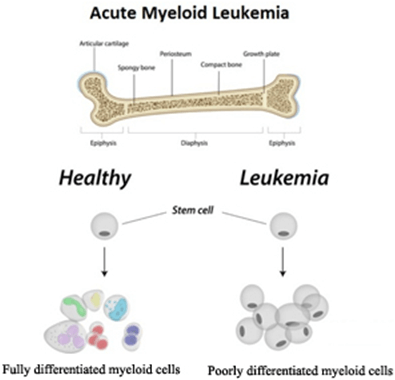AML Full Form | What is Acute Myeloid Leukemia
What is the full form of AML
AML: Acute Myeloid Leukemia
AML stands for Acute Myeloid Leukemia. It is a type of blood cancer that starts in the bone marrow where it affects the immature blood cells (myeloid cells) that are precursors to other blood cells like red blood cells, white blood cells and platelets. It causes the myeloid cells to mutate and form leukemic blasts. Thus it affects the formation of normal healthy cells. Eventually, there will be a shortage of red blood cells, white blood cells and platelets in the body of affected person.

There are different types of AML based on the type of leukemic cells present in the blood and bone marrow. It is also known as acute myelogenous leukemia, acute myeloblastic leukemia, and acute nonlymphocytic leukemia.
AML is caused by unfavorable changes (mutations) in the genes of the DNA of myeloid cells present in the bone marrow. The exact reasons for these mutations are not known.
Symptoms
- Fever
- Pale skin
- Bone pain
- Bleeding gums or nosebleeds
- Frequent infections
- Shortness of breath
- Blood in urine
- Swollen lymph nodes
Risk Factors
- Increasing Age: It is more common in elders of age 65 or more.
- Gender: Men are more likely to develop AML than women.
- Radiations: For example, survivors of nuclear reactor accident.
- Smoking: The cigarette smoke contains benzene and other cancer-causing chemicals.
- Other blood disorders like myelodysplasia and myelofibrosis may increase the risk of AML.
- Genetic disorders like Down syndrome.
- Exposure to certain chemicals like benzene.